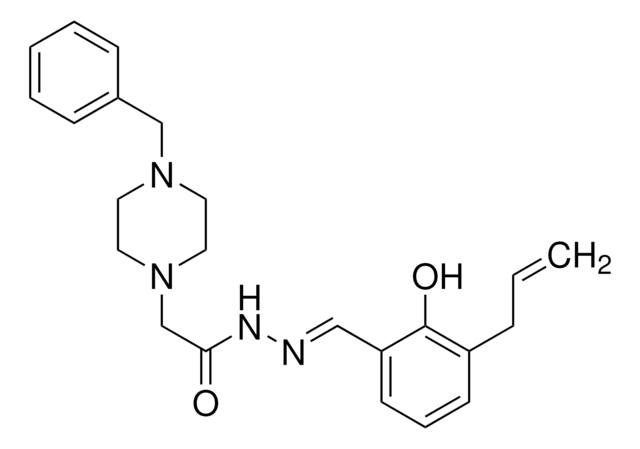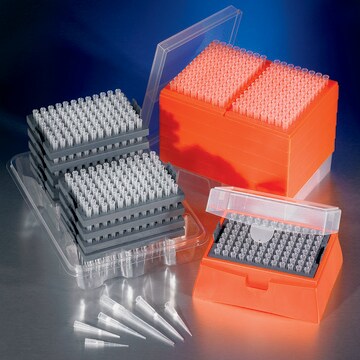推荐产品
生物源
human
品質等級
重組細胞
expressed in Chem-1 cells
製造商/商標名
ChemiScreen
Chemicon®
技術
ligand binding assay: suitable (GTPγS)
radioligand binding assay (RLBA): suitable
NCBI登錄號
UniProt登錄號
運輸包裝
dry ice
一般說明
Human ADCYAP1R1 cDNA encoding the long isoform of PAC1
PACAP (pituitary adenylyl cyclase-activating peptide) is a peptide that exists in 2 forms, 27 or 38 amino acids, and is related to vasoactive intestinal peptide (VIP). Three related class B GPCRs, PAC1, VPAC1 and VPAC2, bind to PACAP; however, VPAC1 and VPAC2 have a much higher affinity for VIP than does PAC1 (Vaudry et al., 2000). Several splice variants of PAC1 result in proteins that differ at the N-terminus and third intracellular loop; these variants differ in their affinities for PACAP and abilities to activate Gq and Gs. High expression of PAC1 is observed in the CNS and the adrenal medulla. Studies with PAC1-null mice indicate that PAC1 plays important roles in regulation of circadian rhythms, neutrophil migration, and pulmonary vascular tone (Hannibal et al., 2001; Martinez et al., 2005; Otto et al., 2004). Chemicon′s PAC1-long membrane preparations are crude membrane preparations made from our proprietary stable recombinant cell lines to ensure high-level of GPCR surface expression; thus, they are ideal HTS tools for screening of antagonists of PAC1-long interactions with PACAP27. The membrane preparations exhibit a Kd of 2.7 nM for [125I]-PACAP27. With 5 µg/well PAC1-long Membrane Prep and 0.75 nM [125]-PACAP27, a greater than 20-fold signal-to-background ratio was obtained.
應用
Radioligand binding assay, and GTPγS binding.
生化/生理作用
GPCR Class: B
Protein Target: PAC1 long isoform / PACAP
Target Sub-Family: VIP/PACAP
品質
Signal:background and specific binding values obtained in a competition binding assay with varying amounts of PAC1-long membrane prep:
SPECIFICATIONS:
1 unit = 5 µg membrane preparation
Bmax: 52.0 pmol/mg
Kd: 2.7 nM
| 10 µg/well | 5 µg/well | |
|---|---|---|
| Signal:Background | 22.9 | 29 |
| Specific Binding (cpm) | 63650 | 62987 |
SPECIFICATIONS:
1 unit = 5 µg membrane preparation
Bmax: 52.0 pmol/mg
Kd: 2.7 nM
規格
Inucbation Conditions
Membranes are mixed with radioactive ligand and unlabeled competitor (see Figures 1 and 2 for concentrations tested) in binding buffer in a nonbinding 96-well plate, and incubated for 1-2 h. Prior to filtration, a GF/C 96-well filter plate is coated with 0.33% polyethyleneimine for 30 min, then washed with 50mM HEPES, pH 7.4, 0.5% BSA. Binding reaction is transferred to the filter plate, and washed 3 times (1 mL per well per wash) with Wash Buffer. The plate is dried and counted. Binding buffer: 50 mM Hepes, pH 7.4, 5 mM MgCl2, 1 mM CaCl2, 0.2% BSA, filtered and stored at 4°C Radioligand: [125I] PACAP27 (Perkin Elmer # NEX294) Wash Buffer: 50 mM Hepes, pH 7.4, 500mM NaCl , 0.1% BSA, filtered and stored at 4°C.
One package contains enough membranes for at least 200 assays (units), where an unit is the amount of membrane that will yield greater than 20-fold signal:background with 125I-labeled PACAP27 at 0.75 nM.
Membranes are mixed with radioactive ligand and unlabeled competitor (see Figures 1 and 2 for concentrations tested) in binding buffer in a nonbinding 96-well plate, and incubated for 1-2 h. Prior to filtration, a GF/C 96-well filter plate is coated with 0.33% polyethyleneimine for 30 min, then washed with 50mM HEPES, pH 7.4, 0.5% BSA. Binding reaction is transferred to the filter plate, and washed 3 times (1 mL per well per wash) with Wash Buffer. The plate is dried and counted. Binding buffer: 50 mM Hepes, pH 7.4, 5 mM MgCl2, 1 mM CaCl2, 0.2% BSA, filtered and stored at 4°C Radioligand: [125I] PACAP27 (Perkin Elmer # NEX294) Wash Buffer: 50 mM Hepes, pH 7.4, 500mM NaCl , 0.1% BSA, filtered and stored at 4°C.
One package contains enough membranes for at least 200 assays (units), where an unit is the amount of membrane that will yield greater than 20-fold signal:background with 125I-labeled PACAP27 at 0.75 nM.
外觀
Liquid in packaging buffer: 50 mM Tris pH 7.4, 10% glycerol and 1% BSA with no preservatives. Packaging method: Membranes protein were adjusted to the indicated concentration in packaging buffer, rapidly frozen, and stored at -80°C.
儲存和穩定性
Maintain frozen at -70°C for up to 2 years. Do not freeze and thaw.
法律資訊
CHEMICON is a registered trademark of Merck KGaA, Darmstadt, Germany
免責聲明
Unless otherwise stated in our catalog or other company documentation accompanying the product(s), our products are intended for research use only and are not to be used for any other purpose, which includes but is not limited to, unauthorized commercial uses, in vitro diagnostic uses, ex vivo or in vivo therapeutic uses or any type of consumption or application to humans or animals.
儲存類別代碼
12 - Non Combustible Liquids
水污染物質分類(WGK)
WGK 2
閃點(°F)
Not applicable
閃點(°C)
Not applicable
Carmen Martínez et al.
Journal of leukocyte biology, 77(5), 729-738 (2005-01-22)
Infections caused by Gram-negative bacteria constitute one of the major causes of septic shock, which results from the inability of the immune system to limit bacterial spread during the ongoing infection. In the last decade, it has been demonstrated that
D Vaudry et al.
Pharmacological reviews, 52(2), 269-324 (2000-06-02)
Pituitary adenylate cyclase-activating polypeptide (PACAP) is a 38-amino acid peptide that was first isolated from ovine hypothalamic extracts on the basis of its ability to stimulate cAMP formation in anterior pituitary cells. PACAP belongs to the vasoactive intestinal polypeptide (VIP)-glucagon-growth
Christiane Otto et al.
Circulation, 110(20), 3245-3251 (2004-11-03)
Pituitary adenylate cyclase-activating polypeptide (PACAP), acting via 3 different G protein-coupled receptors, has been implicated in the regulation of several homeostatic systems in the body, including cardiopulmonary control. To define the physiologic role of the PACAP-preferring type I receptor, PAC1
J Hannibal et al.
The Journal of neuroscience : the official journal of the Society for Neuroscience, 21(13), 4883-4890 (2001-06-27)
The circadian clock located in the suprachiasmatic nucleus (SCN) organizes autonomic and behavioral rhythms into a near 24 hr time that is adjusted daily to the solar cycle via a direct projection from the retina, the retinohypothalamic tract (RHT). This
我们的科学家团队拥有各种研究领域经验,包括生命科学、材料科学、化学合成、色谱、分析及许多其他领域.
联系技术服务部门







